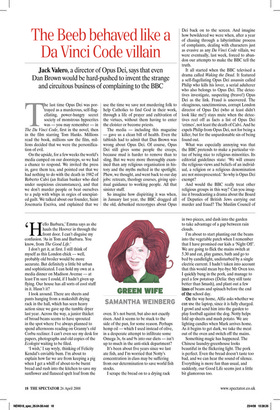The Beeb behaved like a Da Vinci Code villain
Jack Valero, a director of Opus Dei, says that even Dan Brown would be hard-pushed to invent the strange and circuitous business of complaining to the BBC The last time Opus Dei was portrayed as a murderous, self-flagellating, power-hungry secret society of monstrous hypocrites was — you may remember — in The Da Vinci Code, first in the novel, then in the film starring Tom Hanks. Millions read the book, millions saw the film, millions decided that we were the personification of evil.
On the upside, for a few weeks the world’s media camped on our doorsteps, so we had a chance to respond. We invited the press in, gave them tea, and pointed out that we had nothing to do with the death in 1982 of Roberto Calvi (an Italian banker who died under suspicious circumstances), and that we don’t murder people or beat ourselves to a pulp with whips in orgies of unexpiated guilt. We talked about our founder, Saint Josemaria Escriva, and explained that we use the time we save not murdering folk to help Catholics to find God in their work, through a life of prayer and cultivation of the virtues, without them having to enter the cloister or become priests.
The media — including this magazine — gave us a clean bill of health. Even the tabloids had to admit that Dan Brown was wrong about Opus Dei. Of course, Opus Dei still gives some people the creeps, because mud is harder to remove than to sling. But we were more thoroughly examined than any religious organisation in history and the myths melted in the spotlight. Phew, we thought, and went back to our day jobs: retreats, theology courses, giving spiritual guidance to working people. All that sinister stuff.
So imagine how dispiriting it was when, in January last year, the BBC dragged all the old, debunked stereotypes about Opus Dei back on to the screen. And imagine how bewildered we were when, after a year of chasing through a labyrinthine process of complaints, dealing with characters just as evasive as any Da Vinci Code villain, we were eventually, last week, forced to abandon our attempts to make the BBC tell the truth.
It all started when the BBC televised a drama called Waking the Dead. It featured a self-flagellating Opus Dei assassin called Philip who kills his lover, a serial adulterer who also belongs to Opus Dei. The detectives investigate, suspecting (bravo!) Opus Dei as the link. Fraud is uncovered. The oleaginous, sanctimonious, corrupt London director of Opus Dei (who at least didn’t look like me!) stays mute when the detectives reel off as facts a list of Opus Dei ‘crimes’, not least the death of Calvi. And he expels Philip from Opus Dei, not for being a killer, but for the unpardonable sin of being found out.
What was especially annoying was that the BBC pretends to make a particular virtue of being nice to religious minorities. Its editorial guidelines state: ‘We will ensure the religious views and beliefs of an individual, a religion or a religious denomination are not misrepresented.’ So why is Opus Dei exempt?
And would the BBC really treat other religious groups in this way? Can you imagine it broadcasting a drama about the Board of Deputies of British Jews carrying out murder and fraud? The Muslim Council of










































































 Previous page
Previous page